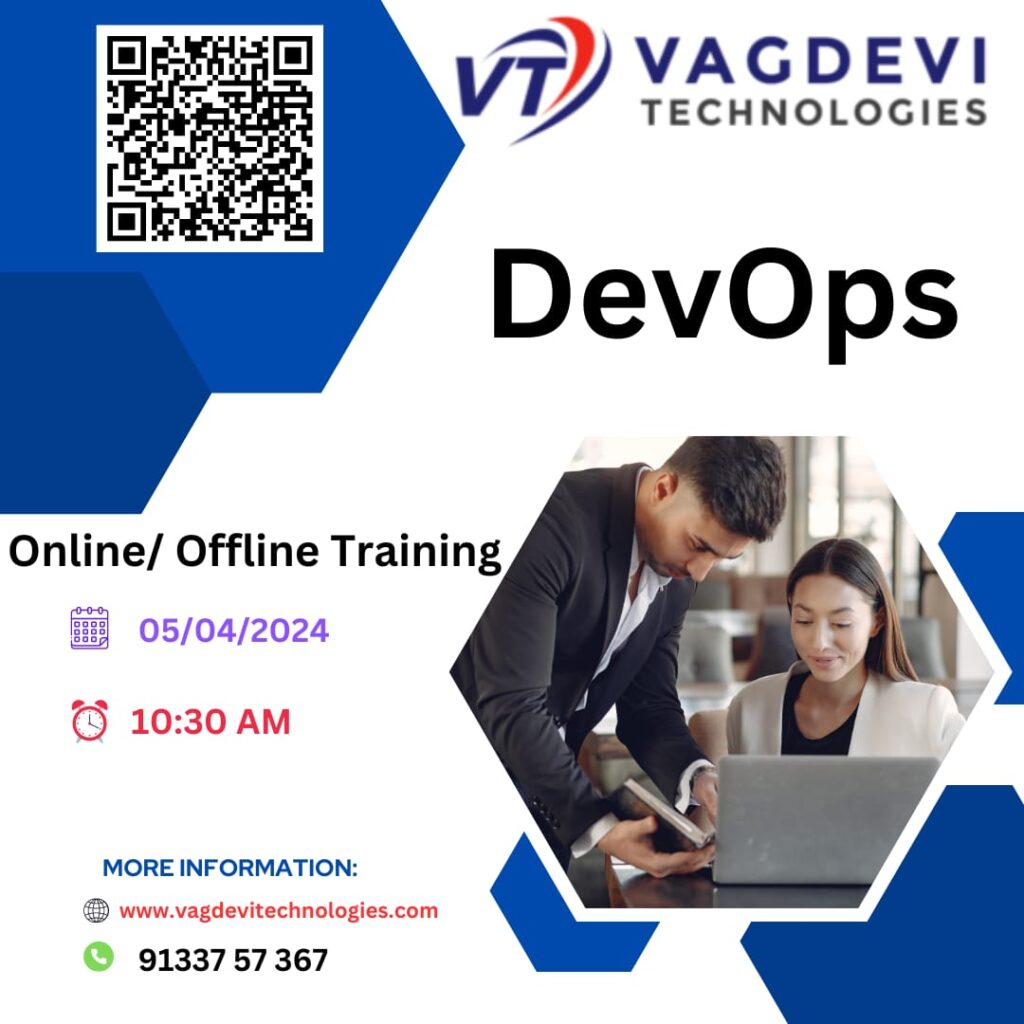Introduction:
Brief Overview of DevOps:
Start by introducing DevOps, its purpose, and how it integrates development and operations to enhance software delivery and quality. Emphasize the growing demand for DevOps professionals and why it’s a key area of focus in the IT industry today.
Why Vagdevi Technologies for DevOps?
Introduce Vagdevi Technologies, located in Bangalore, as a leading provider of DevOps training. Mention the expertise of the trainers and how Vagdevi’s hands-on approach in teaching DevOps provides students with real-world skills.
What is DevOps?
DevOps Definition:
Explain DevOps as a culture, set of practices, and tools that combine software development (Dev) and IT operations (Ops). It aims to shorten the development lifecycle, deliver high-quality software, and improve collaboration across teams.
Key Benefits of DevOps:
Faster Software Delivery
Increased Collaboration
Automation of repetitive tasks
Enhanced Security and Monitoring
Better Product Quality
DevOps at Vagdevi Technologies: Training Approach
Comprehensive Training Modules:
Vagdevi Technologies focuses on providing detailed and practical learning experiences. Highlight the course’s structure, which likely includes both theoretical knowledge and hands-on lab sessions.
Experienced Trainers:
Talk about the qualifications and real-world experience of the trainers. How their experience enhances the training by providing insights into actual industry use cases.
Placement Assistance:
Mention Vagdevi Technologies’ commitment to ensuring that students are industry-ready, with placement assistance and guidance provided post-training.
DevOps Course Content at Vagdevi Technologies
Now, break down the core content of the DevOps course that Vagdevi Technologies offers. Here’s a general course outline that can be customized as per the actual training program:
Introduction to DevOps:
Overview of DevOps principles and practices
The role of DevOps in software development lifecycle (SDLC)
DevOps culture and its importance in modern IT organizations
Version Control Systems (VCS)
Introduction to Git and GitHub
Git commands (clone, commit, push, pull, merge)
Git branching, merging, and conflict resolution
Understanding Git workflow and collaborative coding
Continuous Integration (CI) and Continuous Deployment (CD)
Basics of CI/CD pipelines
Setting up Jenkins for automated builds and testing
Automating deployment using CI/CD tools
Integration with Git, Docker, Kubernetes, etc.
Configuration Management Tools
Introduction to tools like Ansible, Puppet, Chef
Automating infrastructure setup and management
Working with infrastructure-as-code (IaC)
Versioning and monitoring of configurations
Containerization and Orchestration
Introduction to Docker: containers, images, and Docker Hub
Building and managing containers
Orchestration with Kubernetes
Managing microservices with Docker and Kubernetes
Cloud Platforms (AWS, Azure, Google Cloud)
Introduction to cloud computing and services (AWS, Azure, GCP)
Infrastructure setup and management on the cloud
Cloud-native DevOps practices
Integration of CI/CD pipelines with cloud services
Monitoring and Logging
Importance of monitoring in DevOps
Using tools like Nagios, Prometheus, and Grafana for monitoring
Setting up logging and alerting with ELK stack (Elasticsearch, Logstash, Kibana)
Continuous feedback and performance optimization
Security in DevOps (DevSecOps)
Implementing security in DevOps pipelines
Securing containers and cloud environments
Vulnerability scanning and compliance checks
Automation and Scripting
Scripting languages for DevOps (Bash, Python, Shell scripting)
Automating repetitive tasks and processes
Writing custom scripts for CI/CD pipeline integration
Best Practices and Real-World Use Cases
DevOps best practices and strategies
Real-world case studies of DevOps implementation in leading companies
Managing large-scale projects using DevOps principles
Why Choose DevOps Training at Vagdevi Technologies?
Hands-On Labs: Emphasize the importance of practical experience. At Vagdevi, students will work on live projects, gaining the ability to apply DevOps techniques in real-world situations.
Industry-Relevant Tools: Vagdevi provides exposure to the latest DevOps tools and technologies that are in demand in the job market.
Flexible Learning Options: If applicable, highlight any options for online learning, weekend classes, or customized training plans that Vagdevi Technologies might offer.
Certification: Mention if the course offers certification upon completion, which can add significant value to students’ resumes.
Conclusion:
Growing Demand for DevOps Professionals: Conclude by reiterating the importance of DevOps in today’s IT landscape and how Vagdevi Technologies’ training program prepares students for high-demand roles in the industry.
Call to Action: Encourage readers to enroll in Vagdevi Technologies’ DevOps course and start their journey toward becoming certified DevOps professionals.




